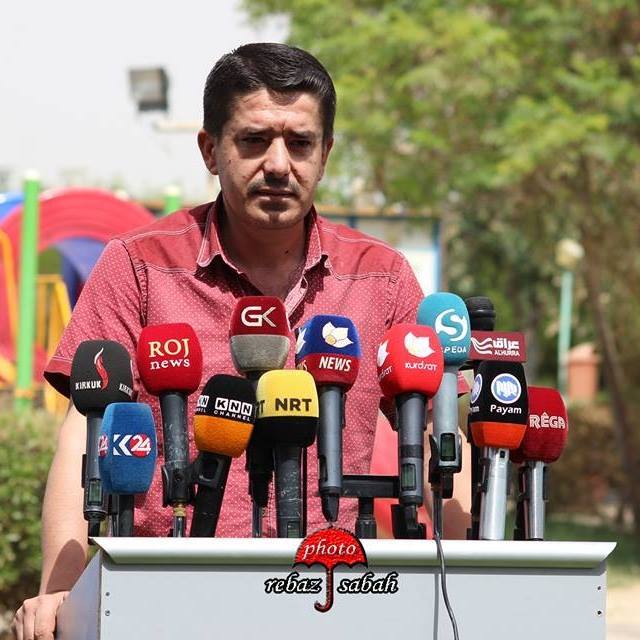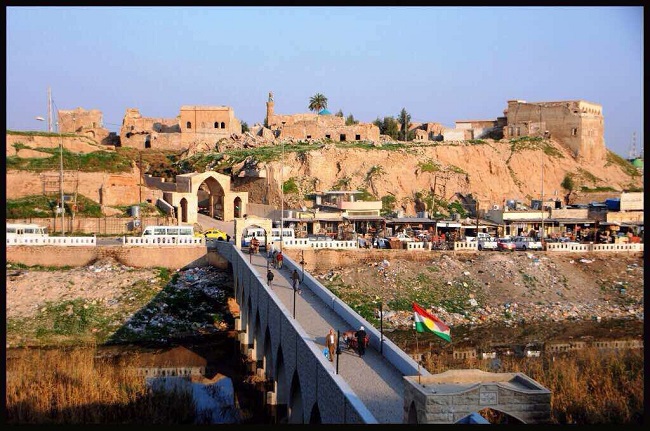Washington Kurdish Institute
December 11, 2018
Kirkuk is often described as a “Mini Iraq” by politicians since the Province contains many of the ethnicities, religions, and other factions found across the rest of the country. Others describe Kirkuk as a place of “brotherhood” for the same reason. Throughout history, Kirkuk was a Kurdish-majority province, and because of that, it has suffered an immense amount of persecution and conflict under successive Iraqi governments and regional powers — not to mention what the province experienced under the whims of various superpowers and their ambivalent policies toward the Kurds.
After the fall of Iraq’s dictatorship in 2003, Kirkuk once again became the center for some of the most pronounced disputes between the Kurds and the new Iraqi Government. Kurdish participation in the newly-elected Iraqi government was encouraged by the promise of the new constitution (adopted in 2005). This new constitution not only officially designated Kirkuk as a disputed territory but also promised a normalization of the region through the provisions in Article 140. The term “normalization” refers to the fair and equitable restoration of Kirkuk’s demographics and property ownership to a time before the Arabization campaigns and other forced demographic policies under the Iraqi government from 1923 through the Saddam Hussein regime in 2003. Much of these Arabization and other forced demographic change policies were targeted against Kirkuk’s Kurdish population as a means of ensuring Arab control of the region’s rich natural resources (i.e., oil and gas).
Yet the Kurds have also faced similar discriminatory policies since 2003. From 2005 till the current day, the Iraqi government has failed to undertake any real normalization policy or process in Kirkuk. Meanwhile, the Federal government, espousing various pretexts, has deprived the province of its constitutional, democratic right to hold local elections. Moreover, Kirkuk suffered under other discriminatory policies: for example, the Iraqi government has refused to restore the province’s original administrative borders and has failed to provide the region with a sustainable budget comparable to other regions of the countries. While Kirkuk provides the rest the Federal government profit from the selling of its oil, the disputed province sees little of the benefits from its own natural resources.
The Federal government of Iraq has also failed Kirkuk in its fundamental obligation to provide adequate security. Kirkuk has had its lion share of terrorist threats and insurgent attacks since 2003, most notably from the district of Haweja, a Sunni Arab majority area where Al Qaeda and other jihadist groups have headquartered. The Iraqi government constantly ignored these threats, refusing local demands to provide adequate supply and needed reform of local security forces. For instance, the Iraqi government repeatedly failed to adequately replace police who were killed or severely injured in the line of duty. In addition,the Iraqi Ministry of Interior never provided adequate replacements for local police equipment and vehicles destroyed in the line of duty.
Meanwhile, most of the terror attacks in Kirkuk have targeted the Kurds. Post-2003 the primary goal of the Iraqi government has been to control Kirkuk and impose martial laws. The Iraqi government began utilizing martial law during the Sunni uprising in 2014 in areas like Baghdad, Mosul, Anbar, Diyala, and Salahuddin — only to fail with the result being the surrender and withdrawal of Federal troops and the rise of ISIS. In 2012 the Iraqi government, headed at the time by Noori al Maliki, created the “Tigris Command” military operation in order to control Kirkuk province. The local Kirkuk government, in coordination with then-Iraqi President Jalal Talabani, were able to successfully foil this unnecessary plan. Yet, eventually the Iraqi government, with support from the United States and regional powers like Iran and Turkey, were able to successfully attack and take control of Kirkuk on October 16, 2017. After this violent act, the Federal government imposed military control over Kirkuk. The decision to undertake this attack came in response to the Kurdish region’s decision to hold an independence referendum on September 25, 2017. Orchestrated by former Iraqi Prime Minister Haider al Abadi, in coordination with Iran and Turkey, these October 16 attacks involved thousands of Iranian-backed proxy militias who engaged in various atrocities against and the displacement of thousands of Kurdish residents in Kirkuk. During these attacks, the Kurdish Peshmerga forces, who have defended the province from ISIS after the Iraqi army fled in 2014, were displaced from the region. Today the province’s security situation is deteriorating at a rapid rate, with Iraqi Federal forces unable to fill the security vacuum left after Peshmerga forces were pushed out. ISIS and other insurgent groups attack Kirkuk, especially the Kurdish areas in Daquq district, on a daily basis. Instead of putting their focus on ISIS and similar elements, the Iraqi Federal forces seem more focused on illegally raiding Kurdish civilian homes, detaining Kurds for flying the constitutionally recognized flag of Kurdistan, and arresting Kurds with notable ties to Kurdish political parties.
Following the infamous events of October 16, Abadi assigned Kirkuk’s deputy governor as the “acting governor” after the Iraqi government removed the Kurdish governor for including the province in the Kurdish region’s September independence referendum. Since the acting governor, a native of Haweja district, took over, a wave of Arabization has begun, similar to that of the Saddam era. Since last year, hundreds of Arab families have been brought to the Kirkuk to take ownership over Kurdish lands with official backing from the acting governor. The October 16 events also resulted in the further marginalization of Kurds in Kirkuk, as the province’s local governing bodies now contain very little Kurdish representation, with many Kurdish elected officials and governmental personnel having been replaced with Arabs.
Today the danger of forced demographic change threatens more than 1.2 million acres of Kurdish-owned agricultural land. The Iraqi government’s long-standing failure to follow its own constitution and normalize Kirkuk has only made it that much easier for the acting governor of Kirkuk to reinstitute these Arabization policies. The acting governor has even cited old contracts illegally created under the Saddam regime as justification for these unjust and inhumane policies.

Hemin Hassib, an independent journalist who lives and works in Kirkuk, spoke to the Washington Kurdish Institute (WKI) about the situation in the city and the province overall.
WKI: How dangerous is the recent Arabization wave in Kirkuk?
Hemin Hassib: The Arabization situation of Kirkuk is above average in a sense that it has affected the demography of Kirkuk. These policies will intensify the issues of Kirkuk ten times more and make it even more complicated because what is happening now makes a future solution for Kirkuk harder. It creates hate among the ethnic groups.
The Arabization process restarted after October 16, 2017, with the transformation of ration cards, identification cards, and issuing premiered residency for people of Diyala, Mosul, Salahuddin provinces to move to Kirkuk. It is true that the Iraqi constitution allows people to live and reside anywhere in the country; however, Kirkuk is exempted. The constitution and the high committee of Article 140 was reaffirmed by an executive order from the council of ministers in 2007. So until all the implementation of all clauses of Article 140 are completed no one can be brought or have their civil data transfered to Kirkuk Province. Therefore all these orders are unconstitutional and against the rules of the council of ministries and the high committee of Article 140. Besides, the agricultural land disputes have not been solved for 15 years by the Iraqi government which is creating tension among the ethnicities and sectors in the province. Another side of the Arabization is the removal of the Kurdish officials and replacing them with non-Kurds.
WKI: How is the security situation of Kirkuk now in comparison to before October 16, 2017?
Hemin Hassib: The security situation is unstable in Kirkuk. We might not see massive security breaches today, not because of the role of the security forces but rather due to after a year of ISIS defeat in Haweja, the terrorists faced disorganization. The terrorists mostly were busy reorganizing. Now we see how the terrorist operations have recently increased significantly, especially in Haweja and Daquq districts. In some areas, ISIS terrorists control the area during the nights, like places near Haftagar near Daquq. Simultaneously, the security forces in charge of Kirkuk are not currently composed of or familiar with the demographics and geographics of the area. It will take years for them to understand the complexities of the area. This is unlike the Peshmerga forces who were able to collect a large amount of data intelligence on the terror groups and their families in the region. Other issues include the corruption and the culture of bribery among these forces, which has further negatively affected the situation. That is mostly due to Baghdad’s lack of centralized decisions over these forces. All the people of Kirkuk suffer from the terrible security situation, not only the Kurds.
WKI: Do you think the people of Kirkuk want martial law in the province?
Hemin Hassib: No. The people of Kirkuk, all the components, do not accept the imposed martial laws simply because the military ruling is above everything. For example, a soldier has more power than a director of a department. This is abnormal and has affected all sectors in Kirkuk, especially the economy. Whenever you suffer such disability, the market gets a hit which results in a poor economy and an increase in unemployment. In addition, the martial laws have given one group powers and have weakened other components.
WKI: In your opinion, how should the Kurds approach their issues in Baghdad, especially with a new government forming in Iraq?
Hemin Hassib: In order to solve their disputes in Baghdad, the Kurds need the following: first, the Kurdish parties need to unite in regards to the issues and end their internal disputes. Second, they should have strategic plans within Iraq and the broader region that should include different scenarios and plans (A, B, and C). There was planning post-ISIS by all sides except for the Kurdish parties. Third, the Kurdish parties should solve their issues, and their demands should be legalized. For example, several laws are pro-Kurds: the Kurdish language is recognized as the second official language in Iraq but currently Kirkuk’s administration has forbidden it. This is a clear violation of the constitution and filing a case to the federal court could change this. However, the Kurdish parties believe in political agreements more than laws. Kurds should realize the reality of the October 16 events and know that Kirkuk will not return to Kurdistan despite the history. Therefore, in my opinion, the best solution for Kirkuk is making it as an independent region. The idea also gets support from the Arabs and the Turkmen. The Kurds should replace Article 140 with a new proposal for an autonomous region in Kirkuk.

